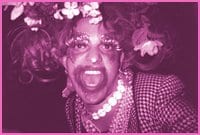Picture a counter-cultural revolutionary. Normally, that job requires a deadly serious demeanor, familiarity with weapons or military strategy and unwavering dogmatism.
Now imagine a queer counter-cultural revolutionary.
Lose the guns and GI Joe temperament (but throw in some sequins, assorted cosmetics and a handful of glitter), and you’d be getting close to describing the self-proclaimed “prancer, romancer and fugitive,” Mattilda (aka Matt Bernstein Sycamore).
These days, the culture Mattilda is countering is also the one that should be her own.
She’s disturbed by, and outspoken about, the stunted growth of gay political activism-which she sees as blindly limiting itself to the mainstream “axis of marriage, child adoption rights and inclusion in the military.”
Currently residing in San Francisco (a city she labels “the mecca of assimilation”), Mattilda has responded with real-time activism, joining ranks with Gay Shame: A Virus in the System, a small direct-action group that battles everything from police brutality to conservative gay business organizations.
And she’s rebelling in print, too, with That’s Revolting: Queer Strategies for Resisting Assimilation.
A book by “freaks, fruits, perverts and whores dedicated to resisting homogenization, globalization, and all the other evils of this ravaging world,” That’s Revolting brings together 32 essays whose topics range from the politics of toilet access for disabled queers, to rampant “sissyphobia” within the supposedly open-minded gay community.
In short, the editor has selected essays by graduate students, activists, scholars and artists-including luminaries like Carol Queen (“Never a Bridesmaid, Never a Bride”) and Patrick Califia (“Legalized Sodomy is Political Foreplay”)-in order to criticize repressive yet prevailing norms relating to race, gender, sexuality, class, physical ability and economic system.
They’re angry essays, to be sure, but also funny, incisive, provocative and, in case after case, filled with practical ideas from which to build a vital, inclusive and vibrant community.
The essayists and their editor are fuelled by a utopian impulse: we have the intelligence to envision a better and less intolerant world, they seem to say, so why not start building it?
At the heart of this activist project is resistance to what Mattilda calls “the monster of assimilation.”
It’s dangerous, she writes, because “queers striving to live outside conventional norms become increasingly marginalized. A ravenous gay mainstream seeks control, not only of our minds and bodies, but of the very ways we represent our own identities. Assimilation means erasure; any queers that call attention to this tyranny risk ostracism, imprisonment, or worse.”
What’s more, Mattilda observes, the comforts offered by so-called mainstream success have caused gay activism to dull its radicalism.
In contrast to the occasionally strident us-or-them rhetoric of her essays, Mattilda in conversation reveals a person who is compassionate about outsiders of all kinds-and incensed by their relegation to the margins.
Her frustration originates with disappointment that the bright promise of gay liberation has been co-opted by a largely male and largely white middle-class group with a narrow band of interests.
For Mattilda, their exclusivity and reform-through-proper-channels strategy can only lead to failure: “The problem with the moderate position of changing the system from within is that, in my experience, that kind of reformist mentality simply becomes part of the system of oppression. And gay becomes redefined along an identity of consumption and privilege; it’s no longer about community building or making room for new ways of being.”
The limits of moderateness have her calling for deep, system-wide changes.
Taking such a left-of-centre stance, Mattilda naturally encountered vocal opponents and like-minded fans during the book’s tour. To spread the word widely about That’s Revolting, she took to the road, launching at 32 locations (from a Washington university bookstore to a Radical Faerie sanctuary in Tennessee) across the US during the presidential election season.
The experience was heartening because in state after state audiences revealed their dissatisfaction with Bush ideology and status quo gay liberation politics, as well as their commitment to diversity and projects looking beyond the concerns of the privileged mainstream.
At least most of the time, that is.
“The best parts were the arguments,” Mattilda recalls, making it clear that differences of opinion were both frequent and heated on the tour. “But at least people were having conversations and listening to each other’s points of view.”
Fundamentally opposed to “disgusting consumeristic gay culture” and the pervasive “white Gaylandia that’s all about the right clothes, the right body and the right address,” Mattilda’s hope rests on the anarchic and polymorphous potential of queerness.
“The beauty and power of queer identity is about providing choice to lust for, to love or fuck one another is as many ways as possible. The mainstream is no longer about creating choices but limiting them and setting up boundaries. And that’s my interest right now-dismantling this kind of system of oppression.”
THAT’S REVOLTING!
Queer Strategies for Resisting Assimilation.
Mattilda (Matt Bernstein Sycamore).
Soft Skull Press, $22.

 Why you can trust Xtra
Why you can trust Xtra


